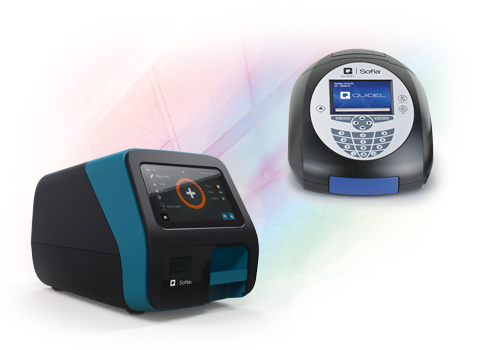More coronavirus testing: New antigen test

Sofia antigen test by Quidel
New antigen test for SARS-CoV-2 infection
A few days ago, the US FDA issued an emergency use authorization for a third category of coronavirus test. I’ve written previously about the RT-PCR test for coronavirus RNA indicating active infection, and the serology test for antibodies against SARS-CoV-2 indicating previous exposure.
Now there is a third type of test: the antigen test. An antigen is any piece of the virus that can be detected using an antibody.
In terms of how this test will be used, it’s similar to the test for coronavirus RNA. The test looks for virus in your nose / nasopharynx and is performed on a swab.
- New antigen test and RNA test both detect active infection. When you get tested for coronavirus, a positive result from either of these tests would mean you are infected and must take actions to avoid infecting anyone else
- New antigen test is very specific. This means a positive result almost certainly means you really do have the virus.
- New antigen test is not as sensitive as the RNA test. Recall that the RNA test uses an amplification technique (RT-PCR) to detect even the tiniest amount of virus RNA. The antigen test does not do any amplification, so it is more likely to miss the target. A negative antigen test might need to be double-checked with an RNA test as follow up.
So what advantage does this new test provide?
Speed. The amplification steps of PCR take time. This antigen test gives an answer in 15 minutes.
Here is relevant text from the FDA press release:
During this pandemic, there have been two types of tests for which the FDA has issued EUAs. One type are polymerase chain reaction (PCR) tests, a molecular diagnostic testing technique that detects the genetic material from the virus and can help diagnose an active COVID-19 infection. The other type are serological tests that look for antibodies to the virus, which can help identify individuals who have developed an adaptive immune response to the virus, as part of either an active infection or a prior infection (serological, or antibody, tests should not be used to diagnose active infection).
This latest FDA authorization is for an antigen test, which is a new type of diagnostic test designed for rapid detection of the virus that causes COVID-19. Each category of diagnostic test has its own unique role in the fight against this virus. PCR tests can be incredibly accurate, but running the tests and analyzing the results can take time. One of the main advantages of an antigen test is the speed of the test, which can provide results in minutes. However, antigen tests may not detect all active infections, as they do not work the same way as a PCR test. Antigen tests are very specific for the virus, but are not as sensitive as molecular PCR tests. This means that positive results from antigen tests are highly accurate, but there is a higher chance of false negatives, so negative results do not rule out infection. With this in mind, negative results from an antigen test may need to be confirmed with a PCR test prior to making treatment decisions or to prevent the possible spread of the virus due to a false negative.
Antigen tests are also important in the overall response against COVID-19 as they can generally be produced at a lower cost than PCR tests and once multiple manufacturers enter the market, can potentially scale to test millions of Americans per day due to their simpler design, helping our country better identify infection rates closer to real time.
This is just the first antigen test to be authorized and we expect more to follow.
Amy Rogers, MD, PhD, is a Harvard-educated scientist, novelist, journalist, and educator. Learn more about Amy’s science thriller novels, or download a free ebook on the scientific backstory of SARS-CoV-2 and emerging infections, at AmyRogers.com.
Sign up for my email list
Share this:



0 Comments